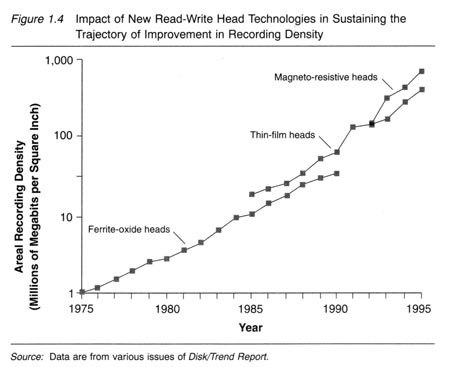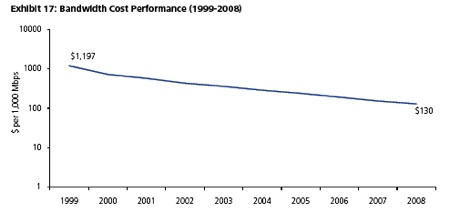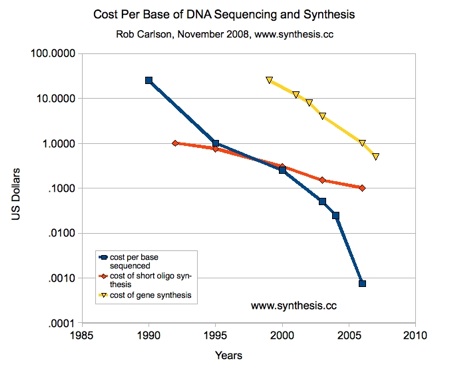Everyone has heard of Moore's law, but there is no obvious reason for its truth. Moore formulated a hypothesis based on inductive reasoning, and it has--amazingly--continued to hold for 40 years. You may not have heard of Kryder's law of disk density, or the others above, but there are many examples of exponential change in the world of technology. Kevin Kelly, Senior Maverick at Wired magazine, is right to draw attention to this strange phenomenon. What is it about technology that lends itself to exponential growth?
One way to answer is to take the side of technological determinism: there's just something about technologies like chip manufacturing. Perhaps it takes a certain amount of time to develop the knowledge to create a certain chip density, and then it takes that same amount of time to double it. This is a reasonable answer, since the development life cycles of projects are typically fixed (at, say, 18 months to two years) and that halving or doubling something every life cycle is a common goal.
Moore's own answer was that his "law" was simply a target at which people could aim. There's nothing inherent about chip manufacturing that lends itself to exponential growth. The notion that chip density should grow exponentially is a human construct.
Neither of these answers is particularly appealing to me. I don't really know what to think. Kelly notes that what looks like a smooth line is actually the waxing and waning of multiple technologies. For example, tape density is not a single technology but is composed of at least three different ones. In other words, each paradigm allows for exponential improvement upon its predecessors. This makes the story of exponential growth contingent upon the invention of new paradigms, but it is surely worth pondering why we have been able to do this over and over again.





I think you're asking the wrong question; these things don't happen on their own. What is it about HUMAN EFFORT that can cause things to develop exponentially? We went to the moon in 10 years. 10 years! I sincerely believe that there's a lot of problems we could solve if we just put forth the effort.
ReplyDeleteThis is Moore's point--it's all about what we want to accomplish. It can't just be a matter of human will, though. There's something about these technologies that allows for exponential progress. I just want to highlight how weird this is. Most change throughout history has taken a long time. Think about the billions of years it took for life to develop. Now much change is happening at a faster and faster rate. Why?
ReplyDeleteCheck out this 1959 talk by Richard Feynman, where he talks about the "room at the bottom" and the potential for miniaturization.
Deletehttp://www.zyvex.com/nanotech/feynman.html
He seemed to foresee Moore's Law in this talk. Basically, his idea is that there is just as much information potential in the small as there is in the large. Once we were able to understand this idea, it's just been a matter of colonizing this space as quickly as possible--it is essentially an open frontier.
I wonder if you were able to graph the increase in our knowledge or understanding of large space--the universe at large--would it also expand exponentially?
Has human knowledge itself -- in general -- expanded exponentially? It sure seems like it.
I think there is so much attention paid to the expansion of small technology and computing because this is a very lucrative expansion (and the people making this expansion have the sorts of minds that would be inclined to calculate the rate of expansion.) But similar expansions in knowledge have been occurring everywhere, no?
What's the reason for this? The refinement of the scientific method? Is the recursive nature of this method related to the exponential growth that seems to occur from its deployment?
Kelly takes the really long view of exponential growth. For a few billion years, we had atoms forming into planets. Then molecules organized themselves into life. Then we got sexual reproduction. Later, minds. Then writing. Then scientific method. Finally (for now), the Internet. Each phase represents a new plateau that builds upon the last, and each follows the last in less and less amounts of time. Interesting idea, at least!
Delete